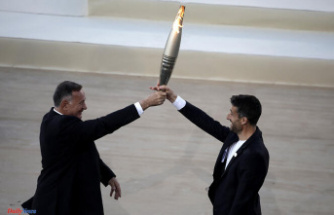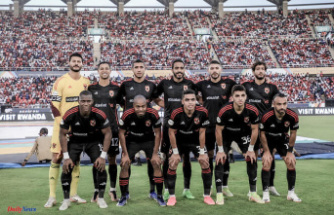The cycling season is slowly coming to an end. All major tours have been driven. But the last races promise high tension. Suddenly it's about the existence of some teams. Because they have slept too long and are about to descend. There's hardly any time left.
Fabian Wegmann should be in an excellent mood these days. The former professional cyclist and now a valued TV expert is part-time sporting director of the Münsterland Giro. And in this year's international race, which is at best second-rate, the top teams from the WorldTour are crowded together. Ten teams from the elite league of cycling will start on October 3rd. This is a doubling compared to the previous year. The reason is as profane as it is life-threatening: the relegation battle has broken out in cycling.
"For some teams it's all or nothing," says Wegmann. What he means: only the best 18 teams in the world qualify for a further three years for the WorldTour and thus automatically for the most important races such as the Tour de France. There are financiers in cycling, which is so heavily dependent on sponsors, who only get involved because of the advertising space in France in the summer. Since two second-class teams are currently in the top 18, two established WorldTour racing teams would have to relegate.
A criterion for participation in this elite club is the three-year ranking of the world association UCI. The problem: Many teams apparently only realized at the beginning of the season that they are now in the last year of the period. At the moment, the Belgian Lotto team with Roger Kluge and the Israel-Premier Tech team with four-time Tour winner Chris Froome are in 19th and 20th place. Button.
For example, Max Walscheid from Heidelberg was forbidden by his team Cofidis to defend his title in the mixed time trial at the World Championships in Australia. "My team wants me to stay in Europe and chase UCI points," said the 29-year-old. Instead of Australia, the fast man drove the Grand Prix d'Isbergues in France and the Omloop van het Houtland Middelkerke-Lichtervelde in Belgium.
The fact that the teams send their best riders through the villages and thus to races like the Münsterland Giro is due to the complex and questionable distribution of points in the system. There are 200 points for a victory in Münster, for example only 120 points for a stage win in the Tour de France. Simon Geschke was rewarded with just 50 points for his self-sacrificing second place in the mountain classification of the tour. "There are people who develop algorithms in which races there is a high probability of scoring points," said Rolf Aldag, head of sports at the comfortably rescued Bora-hansgrohe racing team, of the sports show.
And to make things even more bizarre, the top teams in these races aren't even necessarily about winning. Three drivers in the top ten could score significantly more points than one winner. Last year in Münster, Team QuickStep scored 375 points with five drivers among the top 20. "The rule doesn't come as a surprise," says Kluge, who was directly affected by the relegation battle. "You often hear in the field that we should take over the pace work in front because we have to to save ourselves."
Around 900 points currently separate Kluge's Lotto team from the Arkea team, which is in the last non-relegation zone. That's already a huge mortgage, but catchable. The Israel team, on the other hand, is already 1000 points worse than Lotto and can hardly be saved. Its owner, the billionaire Sylvan Adams, has therefore already threatened to sue and has spoken of a "bastard system". And Jonathan Vaughters, team principal of 16th-placed EF Education, said: "In cycling it's not ascent/descent, it's ascent/death."
Rumors are currently circulating that the UCI could give in and increase the number of teams to 20 for three years. The corona pandemic could give room for justification. Almost every team has had to take one or more drivers out of a race because of an infection in the past two years - and thus lost potential points. However, with one exception, you would be at the same point again in three years. Rather, a parallel revision of the system is required.












